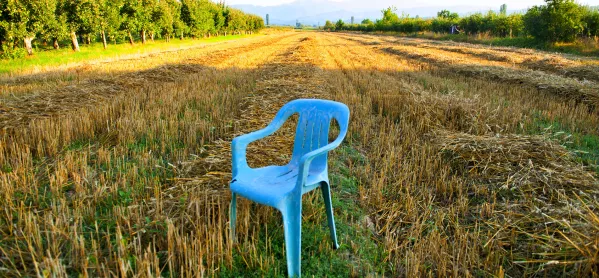Rural authority still struggling for teachers despite Gilruth intervention

Teacher shortages are a huge issue for many Scottish secondary schools, especially in rural areas.
Typically, headteachers find they can fill posts in subjects such as PE and history, but when it comes to the likes of maths, computing and technical education, crippling staff shortages can see job adverts going unanswered for months and pupils missing out.
Last year Tes Scotland highlighted the plight of Aberdeenshire Council.
Its secondary headteachers reported having to operate with multiple unfilled posts. The upshot was upper-secondary students being prioritised over those in early secondary in terms of access to teachers - or, in the worst cases, subjects being cut from the curriculum altogether.
Heads report using non-specialist staff
Aberdeenshire headteachers also reported using non-specialists to deliver classes and primary teachers to plug gaps in English and maths.
Laurence Findlay, the council’s director of education and children’s services, told Tes Scotland at the time that every one of the authority’s secondary schools was affected by teacher shortages.
Recently, however, education secretary Jenny Gilruth has talked about “really positive engagement” with Aberdeenshire Council.
Yesterday in the Scottish Parliament, when Conservative Aberdeenshire West MSP Alexander Burnett asked Ms Gilruth what the government was “going to do to recruit teachers, particularly for our rural communities?”, she revealed she had visited the authority on 16 May and had “been able to increase the number of probationers allocated to that area”.
- Background: Every secondary hit by teacher shortage, says education director
- Related: Are teacher shortages blocking Scottish secondaries’ ambitions?
- Data: Half of places on secondary postgrad teaching courses unfilled
At a general election hustings last week, organised by the EIS teaching union, Ms Gilruth also talked about intervening in Aberdeenshire. She had asked officials to look at its probationer allocation for this year; as a result, she said, its allocation had increased.
She was also working with Highland Council “on exactly the same approach” and wanted to “put on the record the action we have taken this year alone”.
Fewer probationer teachers than hoped for
However, Tes Scotland can reveal that, in Aberdeenshire Council, the education secretary’s intervention has resulted in the authority expecting to receive just two more probationers this year, than it did last year.
In total, Aberdeenshire anticipates that come August and the start of the new school year, 14 probationers will arrive in the authority - a third of the 44 probationers it requested.
Tes Scotland understands that, initially, the government intervention looked more promising.
A total of 20 probationers were allocated to Aberdeenshire Council, which would have been eight more than the 12 it received last year. However, six dropped out.
Generally, councils have been reporting a higher number of probationers dropping out during the induction year - several that saw a fall in their teacher numbers at the time of the teacher census last year, including Glasgow, cited this as a problem and a factor that had contributed to the drop.
Figures obtained by Tes Scotland in March also suggested a higher dropout rate from the scheme in 2023-24.
This comes as fewer probationers are also opting to ”tick the [preference waiver] box”, which effectively means they agree to be placed in any school in Scotland in exchange for a cash boost of £6,000 if they are a primary teacher and £8,000 if they are a secondary teacher.
General Teaching Council for Scotland figures show that in 2019-20, 235 secondary probationers agreed to work anywhere in the country, with 34 allocated to Aberdeenshire. By 2023-24 that figure almost halved to 126 and Aberdeenshire received just two probationers via the preference waiver scheme.
All this adds up to very bad news for rural authorities struggling for staff, and Ms Gilruth has conceded that more needs to be done.
‘We need to look again at the probationer scheme’
In the Scottish Parliament yesterday, she said: “We need to look again at the probationer scheme, which is fully funded by the Scottish government, and ensure that it is better meeting the needs of local authorities such as the members.”
However, Ms Gilruth has made comments like this in the past and no concrete action has followed.
Meanwhile, authorities such as Aberdeenshire soldier on.
Responding to Aberdeenshire’s allocation this year, Mr Findlay said: “We welcome the manual allocation of probationer teachers and while this has only resulted in an additional two probationers next year we hope this figure will continue to rise in future years.
“The final figure of 14 is very disappointing for our schools, who had hoped for so much better next year.”
For the latest Scottish education news, analysis and features delivered directly to your inbox, sign up to Tes magazine’s The Week in Scotland newsletter
Register with Tes and you can read two free articles every month plus you'll have access to our range of award-winning newsletters.
Keep reading with our special offer!
You’ve reached your limit of free articles this month.
- Unlimited access to all Tes magazine content
- Save your favourite articles and gift them to your colleagues
- Exclusive subscriber-only stories
- Over 200,000 archived articles
- Unlimited access to all Tes magazine content
- Save your favourite articles and gift them to your colleagues
- Exclusive subscriber-only stories
- Over 200,000 archived articles
topics in this article



